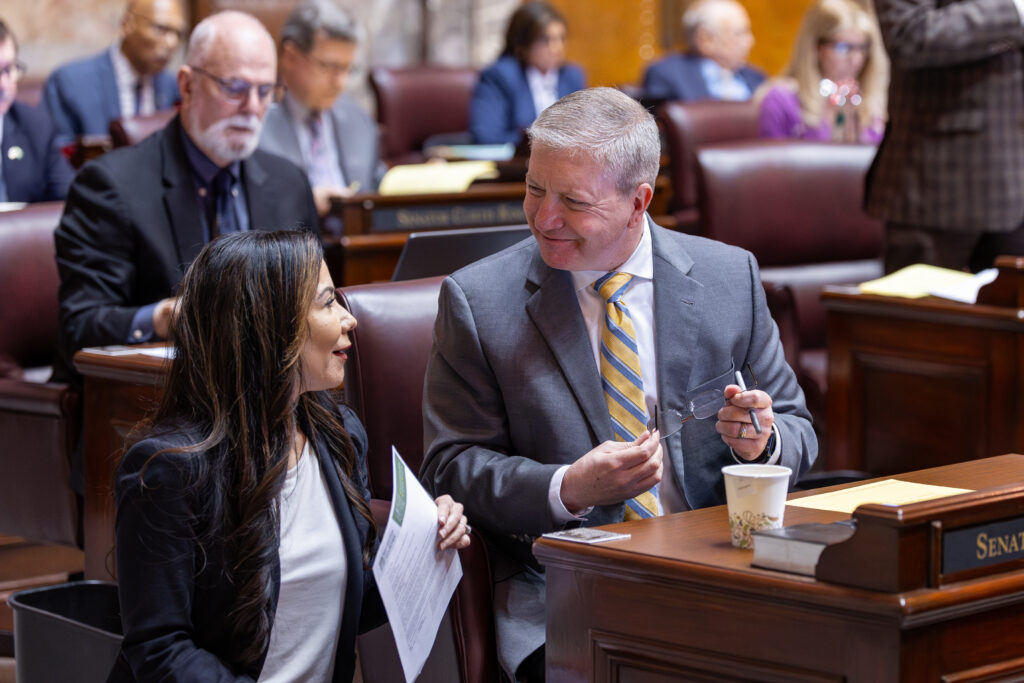OLYMPIA… As Washingtonians mark Tax Day, Olympia is seeing a second wave of tax proposals from the state Senate’s majority Democrats, to go with the $21 billion in new and higher taxes wrapped into the operating-budget proposal they endorsed two weeks ago.
The majority’s new tax legislation emerged today – coincidentally on the same day that the Senate Republicans’ no-new-taxes ‘$ave Washington’ operating budget became a standalone piece of legislation. Prior to today, what is now Senate Bill 5810 had been proposed only as an amendment to the Democrats’ operating budget.
Sen. Chris Gildon of Puyallup, Senate Republican budget leader, offered this reaction to the new tax bills, which would total approximately $12 billion:
“On the same day that people across our state are feeling the sting of federal taxes, the Senate Democrats have more than doubled the number of proposed tax increases on the table. It’s like they want a buffet of tax bills to choose from once they’ve decided how hungry they are – and with 12 days left in the session, there’s plenty of time for the majority to dream up still more ways to take money from the people.
“The budget negotiations between the Senate and House are happening out of public view, so there’s no telling how this will end. But even if the Senate majority pursues this $12 billion set of new taxes instead of the $21 billion in taxes tied to its budget, it would still amount to the largest tax increase in state history. That raises a disturbing question: if the Democrats end up demanding $9 billion less in new taxes, wouldn’t it have been a lie when they asked for $21 billion in new taxes and justified it as being ‘necessary to keep people alive’?
“It can’t be said enough: Our state can have a balanced budget that funds our shared priorities without a single tax increase, or a single cut in services, and without touching the rainy-day fund. Our ‘$ave Washington’ budget is proof that none of the Democrats’ tax proposals is necessary. By filing it as legislation we are keeping it alive through the end of the session, where everyone can see it.”
Sen. Nikki Torres of Pasco, who is assistant budget leader, offered this reaction:
“After going on and on for months about making the wealthy pay more, the majority seems to be falling back on the very thing they complain about – which is to increase the taxes that hit lower- and middle-income families harder, like property taxes and sales taxes.
“The new sales-tax proposal is a very unwelcome surprise, and the fact that there are now two property-tax bills in play tells me the Democrats are locked in on raising property taxes this year. The only question is whether it will be a tripling of the growth rate or worse. A higher tax on businesses would eventually find its way to consumers as well.
“The governor expressed concerns about the so-called ‘wealth’ tax, and the majority didn’t take him seriously when it should have. I also heard the governor say our state’s tax code is too regressive, so what do the Democrats do? They propose a sales-tax increase on top of property-tax increases. Here on Tax Day, the contrast between the Republican and Democrat budget priorities could not be clearer – and I have to believe our priorities line up better with the people we serve.”
The Democrats’ latest tax proposals include:
- Expanding the sales tax on services, particularly computer and IT related services; temporary staffing agencies; security service; data processing; and certain kinds of advertising. This would generate $4 billion over four years at the state level and $1.5 billion in local sales tax (Senate Bill 5814).
- Tripling the cap on “councilmanic” increases of the property-tax rate, making it 3% annually instead of the voter-approved 1%, and lifting the cap on school-district levies based on inflation and per pupil. (Senate Bill 5812, which is identical to House Bill 2049).
- Expanding the tax on most businesses in Washington, such as retailers and wholesalers, which would generate an estimated $6 billion over four years (Senate Bill 5815).
- Raising the tax rate on higher levels of capital-gains income, which would put Washington’s rate at fifth-highest in the nation and generate an estimated $1 billion or more (Senate Bill 5813).
- A new tax the trading in credits to Washington’s requirements that automakers sell a certain percentage of zero-emission vehicles. As written, Senate Bill 5811 would likely apply only to Tesla (the bill is identical to House Bill 2077).









